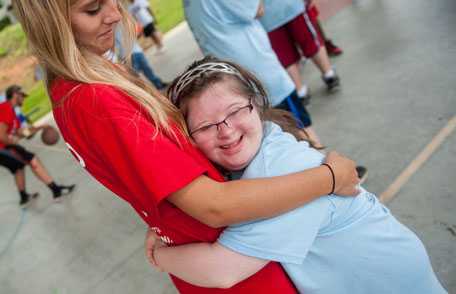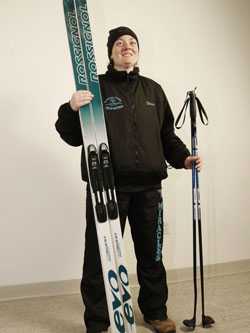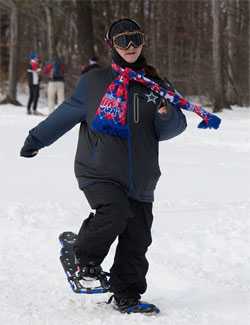Healthy Athletes at Special Olympics Games
 Adults with intellectual disabilities (ID)—difficulty with thinking, learning, remembering, and reasoning—experience poorer access to quality health care and have poorer health outcomes than people without ID. Learn how Centers for Disease Control and Prevention (CDC) is working with Special Olympics to improve the health of athletes with ID.
Adults with intellectual disabilities (ID)—difficulty with thinking, learning, remembering, and reasoning—experience poorer access to quality health care and have poorer health outcomes than people without ID. Learn how Centers for Disease Control and Prevention (CDC) is working with Special Olympics to improve the health of athletes with ID.
In the United States, nearly four million adults have an intellectual disability (ID). People with ID are less likely to manage health conditions, more likely to have difficulty getting quality healthcare services, and often receive fewer preventative check-ups, such as cancer screenings.1
For people with ID, these challenges reflect a serious gap between the healthcare services they need and the healthcare services they receive. The Special Olympics and CDC are attempting to close these gaps by meeting the health needs of people with ID. Together, we can make sure children and adults with ID are included in programs that promote health, and they receive the healthcare services that they need throughout their lives.
Special Olympics World Winter Games
More than 2,600 athletes with intellectual disabilities from 107 nations will gather in Austria in March 2017 for the Special Olympics World Winter Games. This event, which ESPN is scheduled to broadcast, is expected to be the largest Special Olympics World Winter Games in history. More than 15,000 people are expected to attend and will have the opportunity to see athletes compete in nine winter sports, including figure skating, speed skating, snowboard, stick shooting, and more. During the Special Olympics World Winter Games, athletes will receive free essential health screenings, services, referrals, and information through the Special Olympics’ Healthy Athletes program.
Healthy Athletes
Healthy Athletes was created by Special Olympics to help meet the health needs of Special Olympics athletes. Officially launched in 1997, Healthy Athletes organizes its events in a welcoming, fun environment to educate athletes on healthy lifestyle choices and identify problems that may need additional follow-up. Through Healthy Athletes, more than 136,000 healthcare professionals have been trained to treat people with intellectual disabilities. These healthcare professionals provide improved care to athletes from all over the world.

“Going to the World Winter Games is the highest honor”

Special Olympics Kansas athlete Ashley Spriggs has lost over 100 pounds in preparation for the World Games.
Special Olympic Athletes Are Healthy and Ready To Compete!
Heidi’s Story
Special Olympics Wisconsin athlete Heidi Van Abel has been training for months to compete as a cross-country skier in the 2017 Special Olympics World Winter Games. After a health scare, she is training harder than ever. In preparation for the World Games, Heidi had a thorough mandatory physical. Doctors discovered a 6.5-pound tumor in her uterus. She underwent a hysterectomy at age 34. It was a difficult time, but thankfully, the tumor was not cancer.
Eleven weeks after her surgery, Heidi got the news she’d been waiting for: the doctor’s OK to begin training for the World Games! She did not waste a second. By September, Heidi was able to join her health group (made possible through a Healthy Athletes and Healthy Communities grant) on a 12-mile bike ride. As the weather cooled, the group transitioned to a weekly yoga and walking session to keep athletes active outside of their sports training schedules. Heidi is aiming to be in the best possible shape for the global competition ahead. “Going to the World Winter Games is the highest honor,” says Heidi.
Ashley’s Story
Special Olympics Kansas athlete Ashley Spriggs has lost over 100 pounds in preparation for the World Games. She trains two times a day, five days a week, with Special Olympics North America Coach of the Year, John Lair. She is now ready to compete in snowshoeing at the Winter Games. In the morning, Ashley rides the stationary bike for an hour. In the afternoon, her routine usually consists of riding the elliptical for an hour and lifting weights. Once a week she does endurance training in the swimming pool. Ashley started snowshoeing because she is “willing to try anything” says her coach.
CDC would like to thank Heidi, Ashley, and our partner, Special Olympics, for sharing their stories with us.
CDC Supports Special Olympics
CDC has provided funding and public health expertise to Special Olympics since 2002. CDC’s support of the Healthy Athletes program facilitates health screenings for athletes and provides specialized training for doctors and other health professionals.
CDC supports work that improves the overall health and quality of life for people living with disabilities, including those with intellectual disability. CDC supports the inclusion of people with disabilities in public health programs that prevent disease and promote healthy behaviors and safety, while working to eliminate barriers to health care and improve access to routine preventive services.
Follow the 2017 Special Olympics World Winter Games this March and help us support these wonderful athletes in achieving their dreams.
References
- Krahn G, Fox M, Campbell V, Ramon I, Jesien G. Developing a Health Surveillance System for People with Intellectual Disabilities in the United States. Journal of Policy and Practices in Intellectual Disabilities. 2010;7(3):155-166.
More Information
More Information
To learn more about Special Olympics please visit:
- 2017 Special Olympics World Winter Games Official Site
- Special Olympics
- Special Olympics’ Healthy Athletes
To learn more about CDC’s work to improve the health of people with disabilities, please visit:
- Page last reviewed: February 21, 2017
- Page last updated: February 21, 2017
- Content source:
- National Center on Birth Defects and Developmental Disabilities
- Page maintained by: Office of the Associate Director for Communication, Digital Media Branch, Division of Public Affairs




 ShareCompartir
ShareCompartir